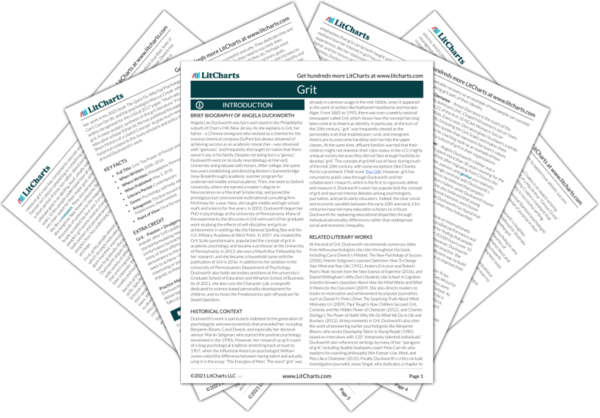Ordinary assumptions about “genius” represent the way that most people instinctively attribute success to innate talent, when it’s more often the result of grit. Angela Duckworth opens Grit by recalling that when she was growing up, her father frequently told her that she was “no genius.” Like many people, Duckworth’s father assumed that people’s achievement depends primarily on whether they’re innately smart, creative, or motivated enough to pull ahead of others. But Duckworth’s research shows that effort influences achievement much more than talent does, which means that geniuses aren’t born—they’re made.
Of course, Duckworth is far from the first scholar to make this point. For instance, back in the 19th century, philosopher Friedrich Nietzsche argued that most people prefer to view accomplished people as natural geniuses rather than recognize all the effort that goes into their achievement (and compare it to their own lack of effort).
Ironically, as an adult, Duckworth won a MacArthur “Genius Grant” precisely for her research showing that grit (and not talent) is the most important factor in achievement. This represents the alternative view of genius that she lays out at the end of the book. For Duckworth, genius is not the ability to succeed effortlessly, which very few people have. Instead, it’s the drive to constantly improve and achieve excellence at the things that one finds interesting and important. Therefore, everyone is capable of being a genius in the right circumstances.
Genius Quotes in Grit
There was about a month between the MacArthur call and its official announcement. Apart from my husband, I wasn’t permitted to tell anyone. That gave me time to ponder the irony of the situation. A girl who is told repeatedly that she’s no genius ends up winning an award for being one. The award goes to her because she has discovered that what we eventually accomplish may depend more on our passion and perseverance than on our innate talent. She has by then amassed degrees from some pretty tough schools, but in the third grade, she didn’t test high enough for the gifted and talented program. Her parents are Chinese immigrants, but she didn’t get lectured on the salvation of hard work. Against stereotype, she can’t play a note of piano or violin.

Unlock explanations and citation info for this and every other Grit quote.
Plus so much more...
Get LitCharts A+We prefer our excellence fully formed. We prefer mystery to mundanity.
But why? What’s the reason for fooling ourselves into thinking Mark Spitz didn’t earn his mastery?
“Our vanity, our self-love, promotes the cult of the genius,” Nietzsche said. “For if we think of genius as something magical, we are not obliged to compare ourselves and find ourselves lacking. . . . To call someone ‘divine’ means: ‘here there is no need to compete.’ ”
In other words, mythologizing natural talent lets us all off the hook. It lets us relax into the status quo.
“You’re no genius,” my dad used to say when I was just a little girl. I realize now he was talking to himself as much as he was talking to me.
If you define genius as being able to accomplish great things in life without effort, then he was right: I’m no genius, and neither is he.
But if, instead, you define genius as working toward excellence, ceaselessly, with every element of your being—then, in fact, my dad is a genius, and so am I, and so is Coates, and, if you’re willing, so are you.












